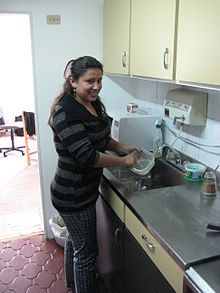How not to help domestic workers
By Joseph Perkins
Rosa Sanchez marched outside the State Building in Los Angeles last week, banging her pots and pans. She was one of a hundred or so domestic workers voicing their support for the so-called Domestic Workers Bill of Rights, sponsored by Assemblyman Tom Ammiano, D-San Francisco.
“We’re tired of being humiliated and mistreated,” Sanchez, a 57-year-old Honduran domestic, told ABC News/Univision. She and her fellow domestic workers typically work 16 hours a day, Sanchez said, without “time to eat or overtime pay.”
Well, I empathize with Senora Sanchez, and with California’s estimated 200,000 domestic workers. But I think Gov. Jerry Brown was absolutely right to veto Ammiano’s legislation last year. And that he should do the same again this year if the measure, AB 241, crosses his desk.
While Ammiano is still tweaking this year’s version of his Domestic Workers Bill of Rights, it reportedly will include the following six provisions: 1) mandatory overtime pay; 2) three paid sick days; 3) workers compensation; 4) designated meal and rest breaks; 5) guaranteed eight hours of sleep; 6) legal entitlement to use kitchen facilities.
The biggest problem with AB 241 is that it is not written for the mass of domestic workers, but for the relatively small minority that are the live-in help of well-heeled employers.
Indeed, the rich folks who own estates in such neighborhoods as Pacific Heights, Beverly Hills and Rancho Santa Fe can afford to pay their maids or nannies overtime, and to give them paid sick days and workers comp.
Cost of compliance
But for most employers of domestic workers, the cost of complying with Ammiano’s bill would be an economic burden. And for some of those, the burden would rise to the level that they would be forced to do without domestic help.
That was one of Brown’s primary objections to last year’s version of the Domestic Workers Bill of Rights. He also was concerned about the strain it would put on state regulators trying to enforce its provisions (like ensuring that live-in domestics got their eight hours). And whether the proposed law would apply to part-time domestics, like babysitters.
The employers that would be most adversely affected by Ammiano’s bill are the elderly, the disabled and the infirm (or their families) who hire caregivers. Sometimes those caregivers are needed to work longer than normal hours. Their employers often cannot afford mandatory overtime.
Ammiano’s new bill would offer exemptions to low-income employers that cannot afford all its provisions. But most middle-income employers of caregivers or other domestic help would find the cost of complying with AB 241 beyond their financial means.
It’s because labor costs are sky high here in California that the state jobless rate remains stubbornly high more than three years into the state’s recovery from the Great Recession. The last thing the state needs is to enact a law, like AB 241, that will lead to fewer — rather than more — jobs.
Related Articles
Unhappy Californians unwilling to change
Sept. 24, 2012 By Steven Greenhut SACRAMENTO — California residents are depressed about the economy and see little hope for
Americans Need Courage from Leaders
Jan. 30, 2012 “Now, a return to the American values of fair play and shared responsibility will help protect our
Advancing bill would upend CA religious schools
California legislators could soon wipe out the social and cultural exemptions afforded to state religious schools that they depend upon




